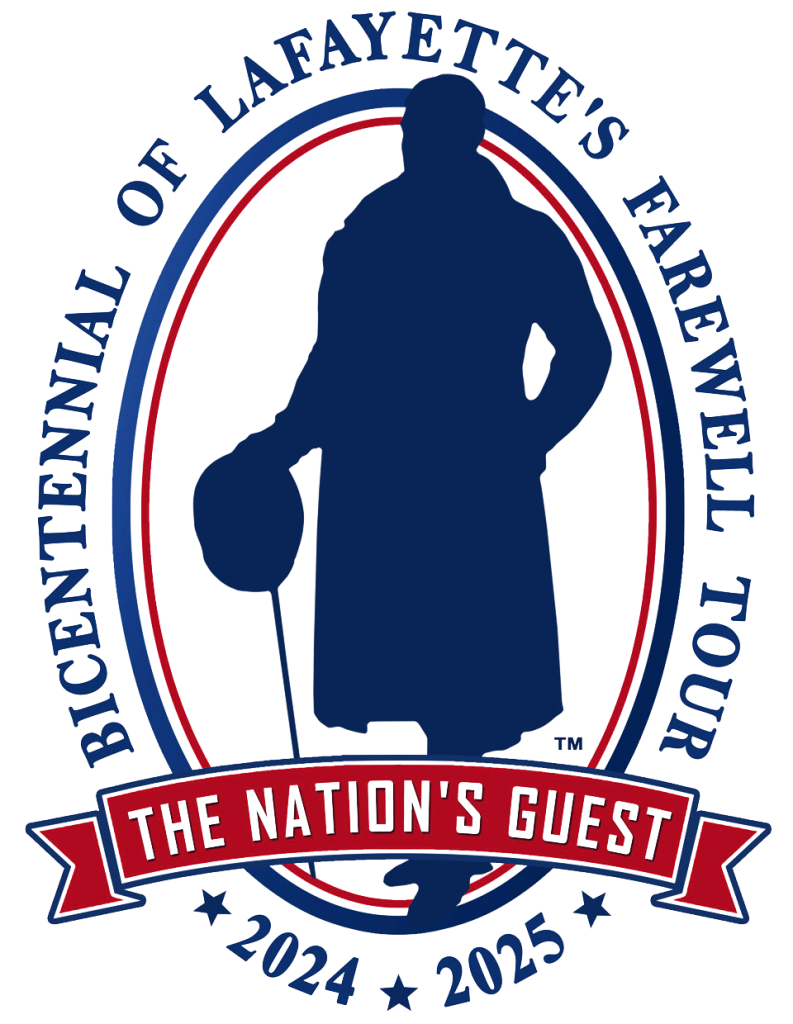This is part of a series on Lafayette’s visit to New England – June 13 to June 29 1825.
Lafayette left Windsor at 9:30 AM. Governor Van Ness and Major General Mower escorted him. From Windsor to Woodstock Gen. Lafayette and suite were brought in carriage drawn by six white horses. The reached Woodstock around 11:00 AM. It had rained most of the morning.
The formal procession was formed near Mr. E. King’s under Chief Marshal Lt. Col. Ransom. The military escort consisted of Woodstock Light Infantry under Capt. B.F. Mower, Pomfret Rifle Company under Capt Snow, Two companies of Woodstock infantry under Captains Richmond and Parker. There was salute from Captain Warner’s Company of Artillery from Barnard.
The procession moved from King’s Corner up Pleasant Street to the White Meeting House. There was triumphal arch thrown across Elm St near the Meeting House with the name of Lafayette in large gilt letters. The arch was the special design of George P. Marsh who had just graduated from Dartmouth.
George Perkins Marsh (1801-1882) is considered by some to be America’s first environmentalist.
From Elm St. the procession proceeded along the north side and around the west end of the “Green” to a station opposite the site of the old Eagle Hotel to a platform ornamented by arches and festoons of evergreen and flowers.
There was an address by Titus Hutchinson chairman of the Committee of Arrangements elected that year one of the judges of the Supreme Court of Vermont.
Titus Hutchinson (1771-1857) Hutchinson had strong anti-slavery views. He participated in the Underground Railroad. There was tunnel from his Woodstock house to nearby Kedron Brook.
Here is his address to Lafayette:
General Lafayette – We have assembled in expectation of your arrival and now bid you the most cordial welcome to this town and village. We have formed to pretension to rival the brilliant specimens of taste and wealth you have witnessed in many populous towns; but we proffer you the homage of our hearts, grateful that you have lived; that you have possessed a spirit of enterprise; that you have labored in the cause of liberty, and that in its own native clime; that you still live to see and enjoy the fruits of your labors; that you live to perform your present tour and enjoy the fruits of your labors; that live to perform your present tour, and be here this day; that we, who before have only heard and read of Lafayette, do now behold him in the midst of us. As you have passed through other states, you have found cities and towns, by you once defended from their enemies, now become populous and wealthy: here are presented to your view a village and a temple reared upon an area which was then clothed with the verdure of forest: and you every where in the United States discover science and the arts, agriculture, commerce and manufactures making rapid strides to eminence under the fostering care and patronage of the free government which we have received as the result of that glorious revolution in which you performed such a conspicuous part.
Although one generation and almost a second have passed away, a few patriots of the revolution still survive. Some of these present have marched in defence of their country in obedience to your commands. These all yet live to tell us and their posterity what our liberties cost and how they were attained: nay more, they are living heralds of your disinterested and efficacious exertions to redeem us from colonial bondage and guarantee to us those free institutions which are at once the glory and happiness of our country, and are extending their benign influence through the world.
We should rejoice in your longer continuance here, if other and higher claims would permit; but we know you must speedily progress on your tour, and we express the sincere desire of our hearts that your path may be strewed with flowers, fragrant flowers, till you arrive at the blissful shores of immortality.”
There is an abstract of Lafayette’s reply
The General immediately made a pertinent and interesting reply to the address. He seemed to retain the whole in his memory, and glanced at the several points nearly in the order exhibited. He expressed, among other things, the satisfaction he derived from so cordial a welcome her, as announced in the address. He also attributed the great prosperity which he observed here and in all his travels in America, to that liberty and free government which we enjoy. In allusion to the revolutionary characters, he said he did not think it strange that so may yet survived considering the interest this State took in the scenes of the revolution, and how many were occupied with those scenes, though the state was then young and thinly settled. He lamented that he could not tarry longer with us; but said it was impossible, as his appointments urged. Hoped we should be pleased to excuse his haste; and wished us prosperity and happiness.
The General was received on the Green by Revolutionary War Veterans and had refreshments at Barker’s Hotel, a lunch that included a whole roasted pig. The ladies held a reception for Lafayette at the White Meeting House. The party left Woodstock around 2:00 PM in a carriage drawn by six white horses.
——————————————————————————————————————————————————————————
For information on the bicentennial of Lafayette’s tour check out Lafayette200.org































































































